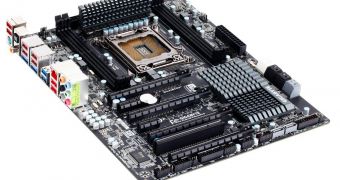In a surprising, and somewhat disheartening, turn of events, Gigabyte has discovered that quite a few of its newest motherboards have a tendency to blow up.
Granted, 'blow up' may be a harsh term, since the issue is that a MOSFET or some other component can fry, and this applies to quite a few boards still in customers' possession.
The original sighting of what seems to be an engineering flaw happened when a Taiwanese overclocker did a mild overclocking experiment on the Gigabyte X79 UD3 motherboard.
"Bad luck" is what most people thought when they learned of the occurrence but, after that, Gigabyte received some more complaints which said that even moderate voltage-assisted CPU overclocking could fry the VRM.
The notices led to investigations and the company eventually found that the issue was more far-reaching than anyone believed.
Gigabyte also discovered that there was more than one problem at work.
The PWM circuitry used some bad quality components, something that bad firmware definitely didn't alleviate.
Gigabyte did provide a fast solution, a new BIOS in fact, but while it does more or less prevent this sort of burnout, it does so by eliminating the overclocking abilities of the motherboards altogether.
The boards in question are the GA-X79-UD3, GA-X79-UD5, and G1.Assassin 2, which enthusiasts bought largely because they could overclock things.
Once the new BIOS is installed, the CPU will be throttled when extreme stress is detected, so as to save the VRM.
Fortunately for enthusiasts, Gigabyte is also accepting faulty products back and offering replacements for free.
No new and fixed platforms are available now, though, but the GA-X79-UD3, GA-X79-UD5, and G1.Assassin 2 have been taken off store from shelves as well, so whenever they start selling again is when replacements will be shipped to affected customers.

 14 DAY TRIAL //
14 DAY TRIAL //